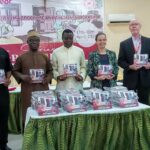President Muhammadu Buhari has said his government is determined to return teachers to their rightful place by fully implementing the professional teaching and teacher qualification framework standards.
He said this will invariably impact on education outcome and performance at the pre-school, basic, secondary and tertiary levels.
BREAKING: Terrorists release remaining Abuja-Kaduna train passengers
Speaking at the event to mark the 2022 World Teachers Day with the theme,” The Transformation of Education begins with Teachers”, Buhari said the new teachers’ policy is already being implemented at the Federal level and in some States and urged States that have not, to do so immediately, “the gains are already showing.”
World Teachers Day is marked every 5th of October to celebrate teachers and draw attention to their welfare and concerns.
Represented by the Vice President, Prof Yemi Osibanjo, Buhari said: “We are also developing a verifiable database of teachers in Nigeria, already the Teachers Registration Council of Nigeria (TRCN) has registered 2, 108, 342 teachers and licensed 1,250,000 teachers.”
“No society can grow beyond its educational attainments, one of the major differences between healthy, well functioning and prosperous societies and poorer societies is education. We owe so much of our well-being as a nation to our educators at every level,” he said.
He said the theme emphasized the importance of teachers to educational transformation but also introduces the important responsibility that teachers themselves have, that is to be at the cutting edge of advancements in education and especially the use of technology and modern teaching methods.
“Education must respond to the dynamism, speed of development and massive changes in society. Educators must understand the skills required to take full advantage of a world dependent on technology. In addition to listening, education today includes writing, ideation, imagining, and critical thinking skills. It is no longer merely learning by rote,” he said.
While noting that they have a huge opportunity in their hands to leapfrog development in education through technology, he said to do this they must continue to invest in expanding the capacity as teachers.
“We cannot integrate technology successfully, as urgently as we need to, without training and equipping teachers,” he said.
Speaking, the Minister of Education, Malam Adamu Adamu, admitted that teaching profession in spite being a noble one, teachers has come to be less appreciated, their roles relegated and their welfare ignored.
“Our teachers, especially at the basic and secondary levels have been at the receiving end of some of the most unfavourable and sometimes intolerable policies, practices and experiences,” he said.
He however said the federal government has implemented the retirement age of Teachers to 65 years with a corresponding increase in service years to 40 years, restored the practice of attracting and retaining the best brains in the teaching profession among others.
“The National Salaries, Incomes and Wages Commission has completed work on the reviewed remuneration package for teachers in basic and secondary schools including provisions for rural posting allowance, science teachers’ allowance and peculiar allowance. Implementation is awaiting conclusion of consultations with state governments and the National Assembly,” he said.
He said to mitigate the current dearth of qualified teachers in the school system, government has commenced the implementation of a teacher conversion programme with ICT training, starting with the Federal Civil Service.
He noted that a number of states have also implemented the scheme.
“We have revamped the curriculum and introduced history and religious knowledge as stand-alone subjects. We are also working with professional associations and religious bodies including the Nigerian Historical Society to address the shortage of teachers in specialized subjects,” he said.
On his part, the National President of The Nigerian Union of Teachers, Comrade Audu Titus Amba, said the education system in Nigeria is in crisis.
He said at the tertiary level, students of public Universities have been out of school for about seven months due to the protracted industrial dispute and the Basic and Secondary Education sub-sectors are faced with serious challenges.
“These include non-implementation of the N30,000.00 Minimum Wage for teachers in some States, shortage of teachers, poor infrastructure, lack of instructional materials, insecurity in schools, inadequate funding and poor conditions of service in general,” he said.




